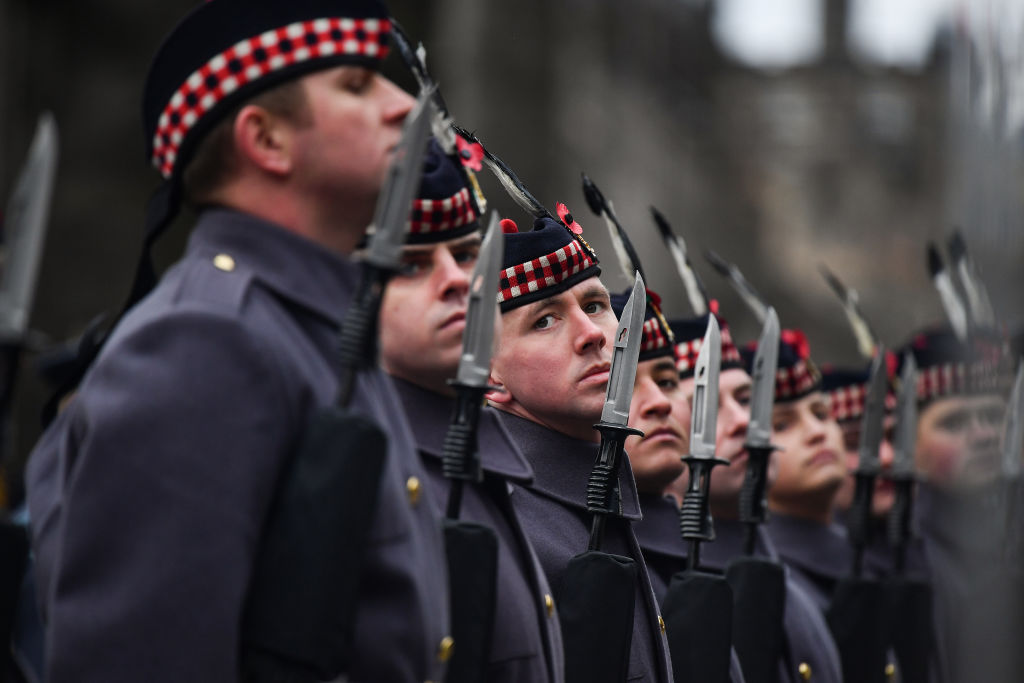Today, on Remembrance Day, wreaths will be laid to remember the fallen at 11am at the Stone of Remembrance. It follows the firing of Edinburgh Castle’s One O’clock Gun at 11am yesterday on Armistice Day. In London, there was a firing of guns from Horse Guards Parade and a procession past the Cenotaph. Last Remembrance Day, Nicola Sturgeon lead a wreath outside Edinburgh City Chambers. Humza Yousaf will likely do the same this morning. The history of Scotland and England is one of shared war.
It’s only relatively recently, then, that Scots have fought alongside the English, playing a major role in the British army.
The union came through war and conquest. By 78 AD, all of England and Wales was under Roman control, but some of Scotland was never taken over. (Around 83 AD, the Romans crossed the Forth and defeated the Caledonian Confederacy, but were only able to take the lowlands. Highland terrain was far too tricky.) From the third century, Barbarians started to attack the British Isles, and by the seventh century, Roman Britannia had dissolved into a number of kingdoms. The Jutes established themselves in Kent and parts of Hampshire, the Saxons in southern England and the Angles in northern England. A couple hundred years later, Vikings plundered England, and in Scotland Kenneth I MacAlpin, king of the Gaelic kingdom of Dàl Riata, conquered the Picts. The fighting seemed to never end.
At the end of the Tudor line in 1603, with the death of the childless Elizabeth I, there was a union of the crowns when James VI of Scotland also became James I of England. Despite James’s hopes for a ‘union of love,’ or, at least, a measure of administrative and economic unity between England and Scotland, the union (in law and fact) remained essentially that only of the monarch. It was weak, and when Charles I repeatedly threatened violence to solve political crises, the civil war began. Charles’s man in Scotland, James Graham, Marquis of Montrose, was a brilliant tactician, but was ordered to lay down his arms when Charles surrendered to the Scots. When union really happened, Britain was a parliamentary creation, the unitary state of Great Britain being established on 1 May 1707.
Risings and rebellions continued regardless. One of the last was the Battle of Culloden in the Scottish Highlands in 1746, that led to a total defeat of the Jacobite claim to Britain. The victory of the Duke of Cumberland led to a complete remodelling of the governance of the Highlands, removing military and judicial powers from Scottish feudal lords, and the Scottish clergy were forced to pledge allegiance to the British royals. The British state was one whose political tone and agenda were set in London and southern England. Scots were brutally forced to accept that.
It’s only relatively recently, then, that Scots have fought alongside the English, playing a major role in the British army. In world war one, it was Douglas Haig, an Edinburgh man, who led the British army on the Western Front in the battles in the Somme, Ypres, Cambrai and in other places. In world war two, the 1st Battalion of the Royal Scots defended Dunkirk during the evacuation. They were ordered on 26 May 1940 to fight ‘to the last round and last man’ in covering the beaches — and they did. When a rogue, isolated group of Royal Scots were taken to a French hospital, the German officer who escorted him said they ‘fought like lions’. Their battalion was almost entirely wiped out.
In the 1960s the Scottish National party began its rise and, by the 1990s, during the campaign for the Scottish Assembly and after the Claim of Right, Scottish nationalism became increasingly popular. Scotland has since had an independence referendum and will likely have another. It’s worth remembering today, regardless of all that, that England and Scotland will be forever bound in mourning.





Comments